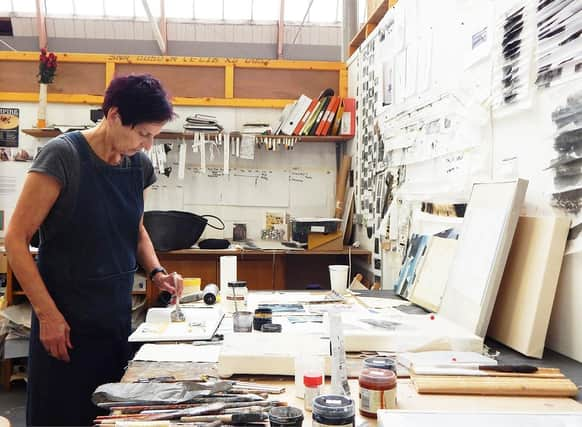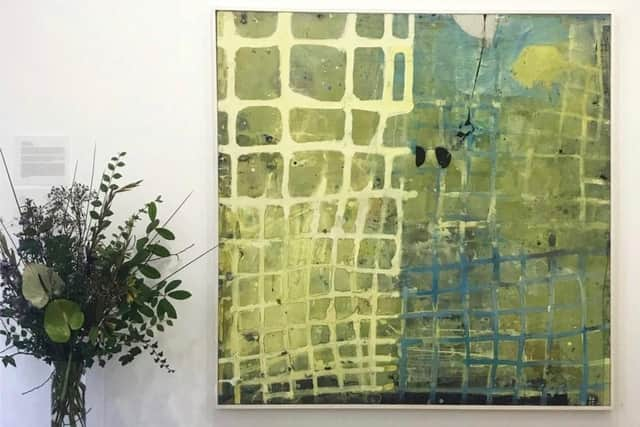Art world mourns "original and creative force"


Diagnosed with pancreatic cancer 12 weeks ago, tributes have poured in from friends and fellow artists, many of whom have been inspired by Liz’s exceptional talents.
The daughter of master joiner James Bruce and his wife Elizabeth (née Abercromby), who worked as a code-breaker at Bletchley Park during the war, Liz was born on September 15, 1945, in the Fyfe-Jamieson Maternity Hospital, Forfar.
Advertisement
Hide AdAdvertisement
Hide AdAlong with her younger siblings, Jean and Keith, she was educated at Aberlemno Primary and Brechin High School. There her talents were nurtured by the school’s art teacher, who encouraged her to apply for a place at art school.


Like many of her generation, Liz’s aspirations were thwarted by her parents’ insistence she get a ‘proper’ job, as a result of which she found herself working as a teller at the Royal Bank of Scotland’s branch in Brechin.
In 1963 Liz was invited to spend a year living in Canada with Toronto-based cousins. Delighted to be given the opportunity to experience a totally different culture, the 18-year-old took every opportunity to broaden her horizons and take on new ideas.
Returning to Scotland she resumed her work with the bank, this time in Edinburgh, before completing a secretarial course at Stevenson College.
Advertisement
Hide AdAdvertisement
Hide AdBy now Liz’s individuality and unique personal style was beginning to reveal itself, most noticeably in a penchant for wearing very individual, distinctive outfits.
A job as secretary to well-known Scottish publisher Archie Turnbull at Edinburgh University Press, saw Liz’s horizons expand still further. She was given the opportunity to travel to book fairs in cities such as London and Frankfurt, although to Liz a book’s cover design would often elicit more interest than its contents.
She met her future husband, Edinburgh University sociology student James Douglas, after both had signed up for the same local authority art class at Darroch School in 1969.
The couple were married in Aberlemno Parish Church on August 16, 1971, and in October of that year moved to Uganda, where Jim had been awarded a postgraduate scholarship at Makerere University in Kampala.
Advertisement
Hide AdAdvertisement
Hide AdLiz was employed as secretary to Professor Ali Mazrui, the well-known Kenyan academic and political writer. At some risk, Liz would smuggle out personal correspondence from the professor to ex-President Milton Obote, then living in exile in Tanzania.
She and Jim delighted in exploring the African countryside and its many game parks, but were forced to return home to Scotland in 1972 following Idi Amin’s expulsion of 50,000 Ugandan Asians.
Doubly determined to secure a place at Edinburgh College of Art, by 1975 Liz had amassed the necessary qualifications to enrol on its honours degree course in drawing and painting.
That same year Liz and Jim left Edinburgh to set up home in Selkirk, having decided the town would make an ideal hub from which to travel the world.
Advertisement
Hide AdAdvertisement
Hide AdLiz studied drawing and painting at Edinburgh College of Art for two years, then chose to have a break to start a family. The couple were delighted with the arrival of their daughter Erika in 1977, and then their second daughter Hannah in 1982.
With Jim now a full-time primary school teacher in Selkirk, Liz became adept at juggling child-rearing with her painting.
Throughout this period she worked from a variety of studios, producing enough material not only to display in local exhibitions, but to sell through outlets such as the Sunflower Gallery in Peebles.
Returning to Edinburgh College of Art in 1990, Liz completed her degree and subsequently secured scholarships allowing her to gain both Master of Arts (MA) and Master of Fine Art (MFA) degrees.
Advertisement
Hide AdAdvertisement
Hide AdWorking mainly in gouache during the early part of her career, Liz’s semi-abstract landscapes made regular appearances at galleries all over the Borders.
Nature in all its manifestations was to provide a life-long inspiration. “She was very observant of the natural environment,” said Society of Scottish Artists council member, and fellow artist, Jenny Pope.
“Her exploration of lichens and moss involved extremely detailed research, and Liz was always willing to share with others the inspiration behind her work.”
In recent years her paintings became increasingly abstract and non-representational, as she explored new methods and techniques.
Advertisement
Hide AdAdvertisement
Hide AdIn the programme notes for her final solo exhibition, staged in March at Edinburgh’s &gallery in Dundas Street, Liz Douglas writes about her ‘immersion’ in particular landscapes.
‘These places are part of a conversation I have with the natural world through the making of painting and drawings. My aim is to create a sense of simplicity in structure, form and colour.
‘I sift and edit from a myriad of visual references… it is the visual reimagining of the landscape that I find compelling.’
The owner of the &gallery, Avril Nicol, said she felt privileged to have staged this exhibition. “I knew of Liz’s diagnosis, so had very mixed emotions. Visitors to the gallery all loved Liz’s work, and she was very well respected by other artists.
Advertisement
Hide AdAdvertisement
Hide Ad“Liz will be greatly missed, and our thoughts are with all of the people who Liz touched with her wonderful life. “
Increasingly interested in ‘visualising the invisible’, Liz would take water samples from special wetland sites such as Selkirk’s ‘Murder Moss’ and the Ettrick Marshes in order to analyse its structure and patterns under a microscope.
This brought her into contact with Frieda Christie, microscopy laboratory manager at the Royal Botanic Garden Edinburgh.
“I was introduced to Liz in the 1990s by artists and colleagues Mary Mendum and Eona Aitken,” said Frieda, now retired.
Advertisement
Hide AdAdvertisement
Hide Ad“Over the next 20 years Liz contacted me with new project ideas. She would give me botanical materials in which she was interested, and would examine these at high magnification under the scanning electron microscope [SEM].
“She was fascinated by the geometric patterns and beauty created by nature. We would sit for hours at the microscope, with Liz pointing to interesting features while I operated the equipment.
“These SEM images provided inspiration for some of her art work. I am proud to have known her, a generous and kind friend who I will sorely miss.”
An illustration of the exciting quality of her work came in 2012, when Liz and four other artists were undertaking a residency at Heriot Watt University’s School of Textiles, in readiness for a show entitled ‘Hidden Stories’ at Edinburgh’s Dovecot Studios.
Advertisement
Hide AdAdvertisement
Hide AdWhen the exhibition’s curator arrived to select pieces for the exhibition, so impressed was he by Liz’s work space that he declared: “I want this whole studio and its contents transported in their entirety up to Dovecot, so students can see what a truly creative artist’s studio looks like.”
Liz’s children remember their mother as someone who would take them for walks in the hills irrespective of the weather conditions, who on family holidays would happily paint for hours in the rain sitting under an umbrella, and who throughout her life always followed her own distinctive path.
Liz Douglas is survived by her husband Jim, daughters Erika and Hannah, and by grandchildren Leo, Bruno, Rosa and Margo, to whom deepest condolences are extended.
The funeral service will be held at The Haining, Selkirk, on Wednesday, May 25, at 12.30pm, followed by burial in the woodland at Shawfield Cemetery at 1.30pm. J. D. R. S.